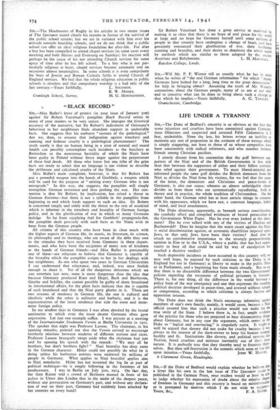LIFE UNDER A TYRANNY
SIR,—The Duke of Bedford's sincerity is as obvious as the fact that some injustices and cruelties have been committed against Conscien-
tious Objectors and suspected and arrested Fifth Columnists is I fear, undeniable. None the less, his letters evince an inability to maintain any sort of proportion in the estimate of these wrongs which is simply staggering, not least to those of us whose sympathies have been consistently with radical reformers, and who number intimate friends among Christian pacifists.
I utterly dissent from his contention that the gulf between sup- porters of the Nazi and of the British Governments is less wide than that between the supporters of either and their fellow nationals who rebel against their government. To most liberal-minded and informed people the same gulf divides the British democrat from the Nazi as divides the Nazi from his victims, for we feel that the cause of the latter, the democrats and Christians and peace-lovers of Germany, is also our cause; whereas an almost unbridgable chasm divides us from those who are systematically repudiating, both in theory and in practice, the whole tradition of Christendom. On the other hand, the German rebel has at least certain things in common with his oppressors, which we have not, a common language, habits of mind, and local attachments.
The Duke dismisses, apparently, as beneath serious consideration, the carefully sifted and compiled evidences of brutal persecution in the Government White Paper. Has he ever even looked at the docu- ment? Has he ever talked with any of the victims of Dachau and Buchenwald? Does he imagine that the worst count against the Nazis is social discrimination against, or economic disabilities imposed upon. Jews, or that only Jews have been their victims? And does he attach no corroborative importance to the strongly preponderating opinion in Eire or in the U.S.A., where a public that has had oppor- tunity to hear all that could be said by way of exculpation has reached a decisive verdict?
Such deplorable incidents as have occurred in this country will, we may well hope, be exposed by such criticism as the Duke is (in England but not in Germany) at liberty to make in the public Press or in Parliament, and a beginning has been made already. But to say that there is no discernible difference between the two Governments' policies regarding the treatment of political prisoners is fantastic. There is, for one thing, all the difference in the world between a policy born of the war emergency and one that expresses the standing political doctrine developed in peace-time, and avowed without scruple or compromise, according to which criticism is always faction and opposition treason.
The Duke does not think the Nazis encourage informing against members of one's own family; mainly, it would seem, because a Nazi official assured him that such a practice would not make for the true unity of the State. I believe there is, in fact, ample evidence of the practice for those who are prepared to hear disconcerting things about Germany, but in any case the argument, which seems to the Duke so " logical and convincing," is singularly naive. It might as well be argued that slavery did not make for cruelty because it was Always to the interest of the slave-owner to keep his human material healthy and fit. Institutions like slavery, and political systems like Nazism, breed cruelties and mistrust inevitably out of their inner nature. It is perfectly true that they thereby tend to frustrate them' selves. But then self-frustration is the nemesis which soon or late fans






























 Previous page
Previous page